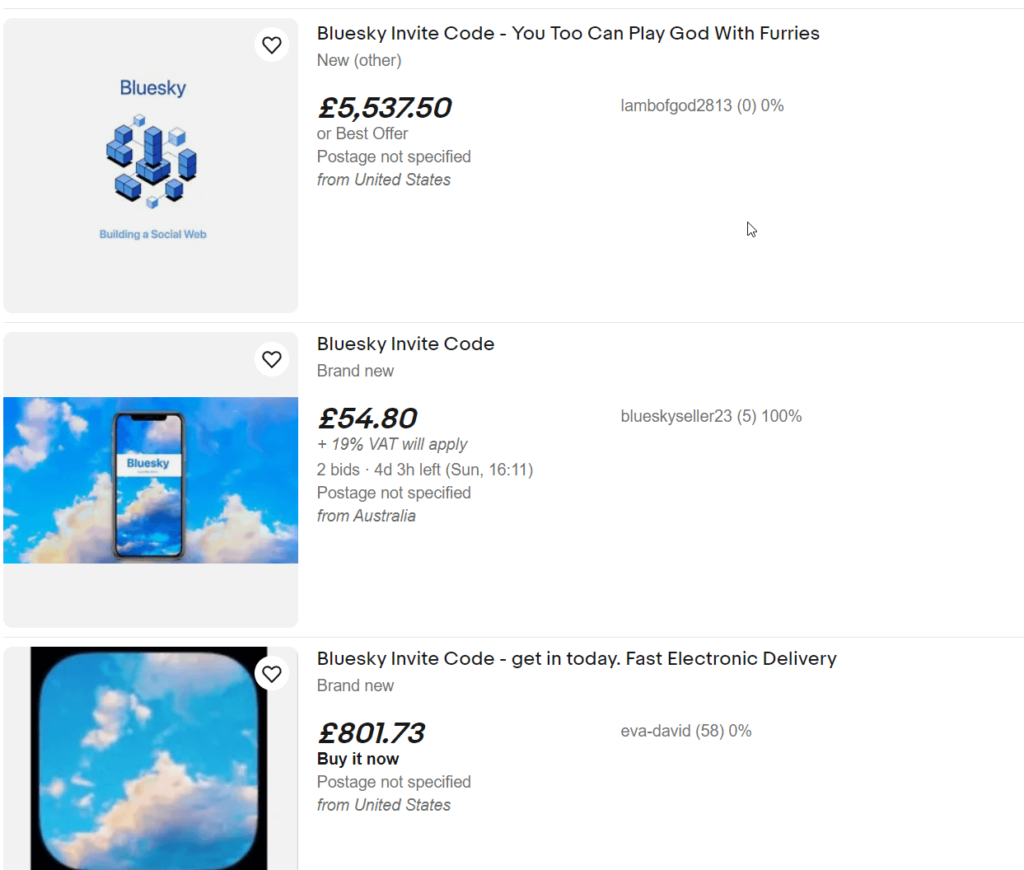If you’re a social media geek like me or even a regular user, you’ve likely heard about Bluesky or, as I like to call it, Twitter 2.0.
It’s a Twitter alternative founded by the company’s former CEO, Jack Dorsey. It has no connections to Twitter (anymore) and it recently opened beta access.
Now, it seems that Bluesky invite codes are being sold on eBay for thousands of dollars.

The reason for this is simple – Bluesky isn’t public yet. They only accept users based on invite codes sent to people on the waitlist.
This creates a sense of rarity and elitism among online socialites. Everyone wants to be on Bluesky but access is restricted to the chosen few.
At the time of writing this article, Bluesky had over 50,000 people in its community and over 375,000 worldwide installs on iOS.
Moreover, the app has been topping every chart imaginable since its release. It’s one of the most trending apps on the download charts in multiple markets, both for Android and iOS.
So far, there isn’t any reliable data about the monthly active users but the estimated ranking of the app is nothing short of spectacular:
- Number 3 among social apps on Google Play in terms of downloads in Japan (April 24th)
- Number 8 among social media apps downloaded on iOS in Japan (March 4th)
- Number 10 among social media apps downloaded on Google Play in the UK (April 26)
- Number 10 among social media apps downloaded on iOS in the UK (April 23)
Also, Bluesky appears to be issuing new invite codes to existing users for “every two weeks they use the app“. If users invite other trustworthy participants, they’ll receive even more invites.
Basically, it’s a system where they encourage the organic and healthy development of the community through invites. But, it also makes the platform extremely exclusive, and many are dying to get a taste of it.
Why Is Bluesky Using Invite Codes?
The founder of Blueksy himself, Jack Dorsey, said that “Spammers and bad actors who want to manipulate public discourse can take advantage of social networks. It’s far easier to limit sign-ups and let them spread through an existing social graph than it is to try to clean up rampant network abuse retroactively.“
However, with the recent reveal that Bluesky invite codes are being sold on eBay, it seems that spammers and bad actors will manage to infiltrate the platform sooner or later.
While the idea of invite codes is not that bad, it does create a sense of exclusivity, which creates real-world value for those invitations. People will be more likely to buy them because they want Dorsey’s secret club.
I’m fairly certain that, if Bluesky keeps this system in place, they’ll always have problems with the commercialization of invite codes on sites like eBay. Unless they put up another system that somehow detects this…
Is Bluesky Worth It?
That’s still unclear as of now. I’m sorry to say that I’m not part of the elite few with access to Bluesky.
What I can tell you is that Bluesky promises to be decentralized, being in stark opposition to Twitter’s centralized governance.
What do I mean by “decentralized“? To put it simply, the user data is in the user’s hands, not the company’s. This leads to better content moderation, better privacy, more anonymity, and more user control over their social presence.
The idea is to create a self-governing social ecosystem that takes care of itself through every individual user who takes part in the governing process.
If you want to learn more about it, read Vox’s article. They did a pretty thorough analysis of Bluesky, its origins, and how it works.
As for me, I’m very interested in how the platform will tackle the commercialization of invite codes in the future. Will they abandon the system or double down with various countermeasures to prevent this from happening?
Stay tuned to Whizcase for more details on this!




